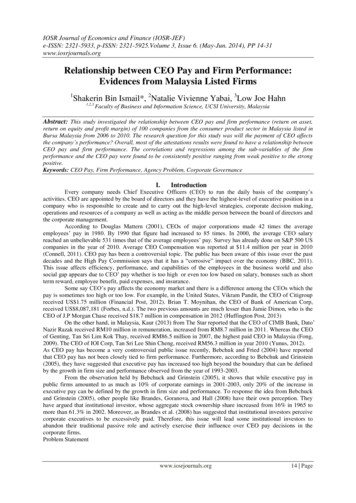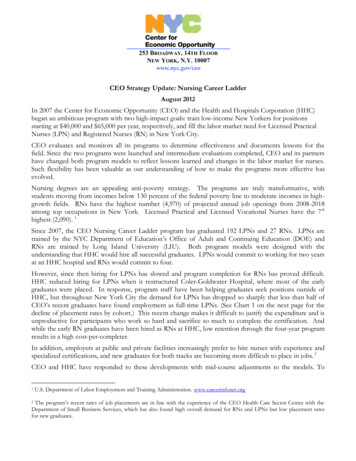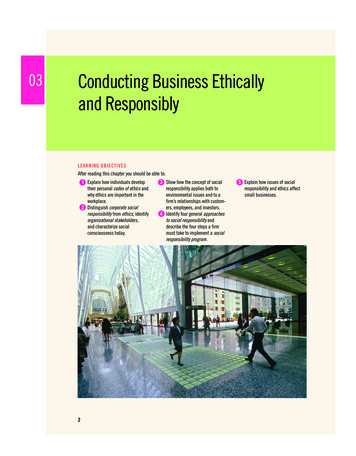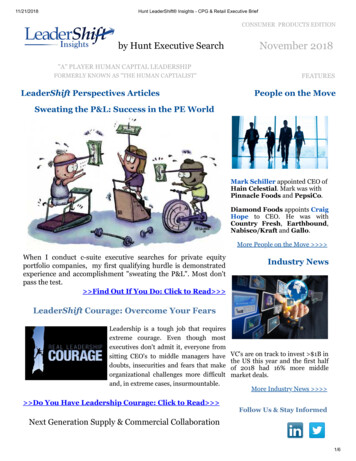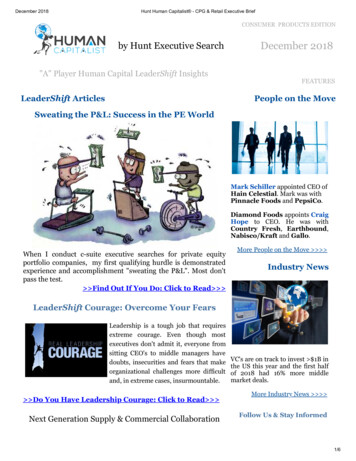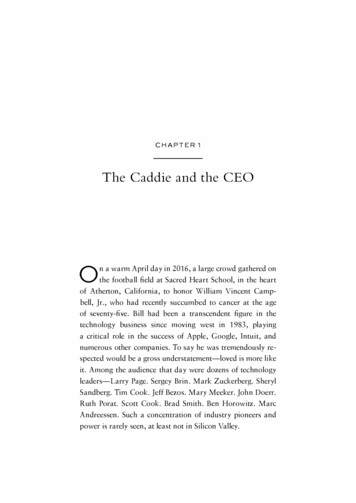
Transcription
CHAPTER 1The Caddie and the CEO0n a warm April day in 2016, a large crowd gathered onthe football field at Sacred Heart School, in the heartof Atherton, California, to honor William Vincent Camp bell, Jr., who had recently succumbed to cancer at the ageof seventy-five. Bill had been a transcendent figure in thetechnology business since moving west in 1983, playinga critical role in the success of Apple, Google, Intuit, andnumerous other companies. To say he was tremendously re spected would be a gross understatement-loved is more likeit. Among the audience that day were dozens of technologyleaders-Larry Page. Sergey Brin. Mark Zuckerberg. SherylSandberg. Tim Cook. Jeff Bezos. Mary Meeker. John Doerr.Ruth Porat. Scott Cook. Brad Smith. Ben Horowitz. MarcAndreessen. Such a concentration of industry pioneers andpower is rarely seen, at least not in Silicon Valley.
TRILLION DOLLAR COACHWe-Jonathan Rosenberg and Eric Schmidt-sat amongthe audience, making subdued small talk, soft sunshine con trasting with the somber mood. We had both worked closelywith Bill in the previous fifteen years, since we had joinedGoogle as the CEO (Eric, in 2001) and the head of prod ucts (Jonathan, in 2002). Bill had been our coach, meetingwith us individually every week or two to talk through thevarious challenges we had faced as we helped grow the com pany. He had guided us as individuals and teammates, work ing mostly behind the scenes as Google went from a quirkystartup to one of the most valuable companies and brands inthe world. Without Bill's help, there was a chance that noneof that would have happened. We called him Coach, but wealso called him friend, and in this we were like pretty mucheveryone around us. In fact, as we later found out, many ofthe people in the audience that day, an audience that num bered well over a thousand people, considered Bill to be theirbest friend. So who, among all of these best friends, wouldhave the honor of eulogizing our Coach? Which high-techluminary would step to the podium?THE CHAMPION FROM HOMESTEADBill Campbell didn't even get to California until his earlyforties, and he had started his business career only a fewyears before that. In fact, this Silicon Valley success storypacked a few lifetimes' worth of accomplishments into hisseventy-five-year span. He grew up pugnacious and smart in2
THE CADDIE AND THE CEOthe western Pennsylvania steel town of Homestead, where hisfather taught physical education in the local high school andmoonlighted at the mill. Bill was a good student and workedhard. Astute too: he wrote an April 1955 op-ed in his schoolnewspaper that reminded his fellow students "there is noth ing more important to you in later life" than good grades."Loafing in school may prevent one's chances of success." Hewas a freshman at the time.A football star at Homestead High, Bill left home in thefall of 1958 to attend Columbia University in Manhattan.He was an unlikely-looking football hero even in that erawhen football players were far more human-sized than theyare today: maybe five ten, 165 pounds (although listed in theprogram at 180). But he quickly earned the respect of coachesand teammates alike with his all-out play and on-field intelli gence. By his senior year, the fall of 1961, Bill was the captainof the team, playing practically ever y minute of every gameas a linebacker on defense and lineman (guard) on offense.He earned All-Iv y honors and helped lead the team to the Iv yLeague title, the only one in Columbia's history. The team'scoach, the wonderfully named Buff Donelli, called Bill "a tre mendous influence" in winning the title. "If he stood 6 feet 2and weighed 225 pounds and played pro ball, he'd be thegreatest lineman the league ever had, a ball of fire. But he'sa little guy who weighs only 162. Not even in college ball doyou find guards that small. Ordinarily you can't play foot ball with little guys. Attitude generally isn't enough. A coachneeds attitude plus players." 1Bill's attitude, naturally, was all about the team, saying3
TRILLION DOLLAR COACHthat it succeeded "because the players worked together andhad senior leadership." 2TOO MUCH COMPASSIONBill didn't have much money, so he helped pay for his educa tion at Columbia by driving a cab. He learned the city so wellthat later in life he often argued with his longtime driver andfriend, Scotty Kramer, about the best route to take. (When itcame to navigating New York you didn't question the coach,Bill (67) leads the blocking for Columbia during the Lions' 26-14 victory overHarvard on October 21, 1961. 4
THE CADDIE AND THE CEOScotty says.) He graduated from Columbia in 1962 with adegree in economics, received a master's degree in educationin 1964, and migrated north to become an assistant foot ball coach at Boston College. Bill was an outstanding coachand quickly became highly respected among his peers. Sowhen his alma mater, Columbia, asked him to return as itshead coach in 1974, he agreed. Although Columbia's foot ball program was woeful, Bill's loyalty guided him back toManhattan.(One of Bill's coaching colleagues, Jim Rudgers, notes thatbefore Bill "let his heart take him" back to Columbia, he wasconsidered one of the top assistant coaches in the countryBill's teammates carry him off the field after Columbia's 37-6 win over Universityof Pennsylvania on November 18, 1961. The victory clinched Columbia's first IvyLeague championship. 5
TRILLION DOLLAR COACHand was offered the opportunity to coach at Penn State underJoe Paterno. At the time, Paterno was one of the top coachesin the country, and it seems likely that Bill would have con tinued to thrive as a coach had he joined the Nittany Lions.In fact, this book might have been about Bill Campbell, col lege football legend, rather than Bill Campbell, Silicon Valleylegend. And to learn more about him you might be doing aYahoo or Bing search!)Despite his abundant coaching talent, Bill did not win inhis return to Columbia. Hampered by crummy facilities thatwere at least a thirty-minute bus ride from campus in after noon traffic, an administration that was perhaps not fullycommitted to gridiron success, and a city in general decline,the Lions won only twelve games during his tenure, losingforty-one. His most hopeful season was 1978, when the teamstarted 3-1-1 but then got crushed at Giants Stadium, 69-0,by a much bigger (physically and numerically) Rutgers squad.Bill decided partway through the 1979 campaign that he wasgoing to resign. He completed the season and was done.Bill worked so hard during his time at Columbia that atone point he had to take a break in a hospital to recover fromexhaustion. Recruiting players was particularly challenging.Bill later said that he would have to visit a hundred prospectsjust to get twenty-five of them ro come. "I'd leave after work out programs, at 4:30, and I'd drive to Albany and back in anight. Scranton and back," he added. "Just so I could be backin the office the next day."5His failure, though, wasn't for lack of players. It was, ac cording to Bill, for too much compassion. "There is some thing that I would say is called dispassionate toughness that6
THE CADDIE AND THE CEOyou need [as a football coach], and I don't think I have it.What you need to do is not worry about feelings. You've gotto push everybody and everything harder and be almost in sensitive about feelings. You replace a kid with another kid;you take an older guy and replace him with a younger guy.That is the nature of the game. Survival of the fittest. Thebest players play. In my case, I worried about that. I tried tomake sure the kids understood what we were doing. I justthink I wasn't hard-edged enough."6Bill may have been correct in believing that success as afootball coach depends on "dispassion," but in business thereis growing evidence that compassion is a key factor to suc cess.'7 And as it turned out, this notion of bringing compas sion to the team worked much better for Bill in the businessworld than on the football field.LET'S RUN ITHis football career was done. At age thirty-nine, Bill enteredthe business world by taking a job with the ad agency J. Wal ter Thompson. He started in Chicago, supporting Kraft, thenseveral months later moved back to New York to supportKodak. He dove into his job with customary passion, im pressing his clients in Rochester, New York, so much with his'' A 2006 paper by Peter Frost, Jane Dutton, Sally Maitlis, Jacoba Lilius,Jason Kanov, and Monica Worline contains a compendium of researchover the past century confirming the high value of compassion in theworkplace and organizations.7
TRILLION DOLLAR COACHknowledge and insights about their business that they soonhired him away from the agency. Bill rose quickly at Kodak,and by 1983 he was working in London as the company'shead of consumer products for Europe. During his initial jobsearch in 1979, one of his Columbia football buddies hadconnected Bill with John Sculley, who was then a senior ex ecutive at PepsiCo. Bill didn't take the job that John offeredat Pepsi, but in 1983 Sculley decamped to Silicon Valley tobecome CEO of Apple, and shortly thereafter he gave Bill acall. Would he be willing to leave Kodak and move his youngfamily-he had married the former Roberta Spagnola, a deanat Columbia, in 1976-west to come to Apple?"My career had been blunted by a lot of years as a dumb ass football coach," Bill later said. "I felt that because of mybackground, I would always be below my peer group andtrying to catch up. Going out to the wild, woolly west, whereit was more a meritocracy, I would have a chance to movequickly and sit on the management team." 8 Move quickly,indeed. Within nine months of joining Apple, Bill was pro moted to VP of sales and marketing and given the task ofoverseeing the launch of the highly anticipated Macintosh,Apple's new computer that would replace the Apple II as thecompany's flagship product.To kick off the launch, the company made a big move: itbought a slot to run a commercial during the Super Bowl,which would be played in Tampa, Florida, on January 22,1984. Once the ad was produced, Bill and the team showedit to Apple cofounder Steve Jobs. An allusion to GeorgeOrwell's novel 1984, it showed a young woman runningthrough a dark hallway, fleeing guards, and emerging into a8
THE CADDIE AND THE CEOchamber where hundreds of gray-clad, head-shaven men arelistening, zombie-like, to a droning "big brother" figure ona large screen before them. With a yell, she throws a largemallet through the screen, causing it to explode. A narratorpromises that the Apple Macintosh will show us why "1984won't be like 1984.".Steve loved the ad. E. Floyd Kvamme, Bill's boss at thetime, loved the ad. Bill loved the ad. About ten days beforethe game, they showed it to the board.The board hated the ad. This is terrible, was the universalopinion, too costly and too controversial. They wanted toknow if they could sell the airtime to some other advertiser.Was it too late to back out? A couple of days later, one ofthe Apple sales executives told Bill and Floyd that she hadbeen able to find a buyer for the slot. "What do you think weshould do?" Floyd asked Bill."Fuck it! Let's run it," was Bill's response. They never toldthe board or other top executives that they had a potentialbuyer for the slot, and ran the ad. It became not only themost popular spot of the game, but one of the most famouscommercials of all time, ushering in the era of Super Bowlads becoming as big as the game itself. ALos Angeles Timescolumn in 2017 called it the "only great Super Bowl commer cial ever."9 Not bad for a "dumb-ass football coach" less thanfive years removed from his final season.In 1987, Apple decided to spin off a separate softwarecompany called Claris and offered Bill the position of CEO.'' Search "Apple 1984 commercial" on your favorite search engine to seethe ad.9
TRILLION DOLLAR COACHHe jumped at the opportunity. Claris did well, but by 1990Apple pulled it back into the fold as a subsidiary rather thanfollow the original plan of letting it become its own pub lic company. This shift spurred Bill and several other Clarisexecutives to leave. It was an emotional decision, and whenBill departed, several Claris employees demonstrated theirgratitude to him by taking out a full-page ad in the San JoseMercury News. "So long, Coach," the headline read. "Bill,we'll miss your leadership, your vision, your wisdom, yourfriendship and your spirit . " the ad continued. "You taughtus how to stand on our own. You built us to last. And eventhough you're no longer coaching our team,we're going to doour best to keep making you proud." Claris continued as anApple subsidiary until 1998.Bill became the CEO of a startup named GO Corpora tion, which attempted to create the world's first pen-basedhandheld computer (a precursor to the PalmPilot and today'ssmartphones). It was an ambitious vision but ahead of itstime, and the company shut down in 1994. "GO didn't go,"Bill was fond of saying.Around that time, Intuit cofounder and CEO Scott Cook,along with his board of directors, was looking to replacehimself as CEO. John Doerr, a Kleiner Perkins venture cap italist; introduced Bill to Scott. At first, the founder wasn'timpressed with the coach. A couple of months passed andScott still didn't have a new CEO, so he agreed to meet'' John is one of the more successful VCs in Silicon Valley, having ledKleiner Perkins's investments in companies such as Google, Amazon,Netscape, Sun, Intuit, and Compaq.10
THE CADDIE AND THE CEOSan Jose Mercury News Monday, February 25, 19915D'Claris has just lost one of our hardest-workingemployees.Bill Campbell is on his way to lead anotherbunch of impossible dreamers over at GO Corpora tion, those guys with the pen-based notebookcomputing system.And the bunch he left behind would like topublicly tender him the biggest compliment we canconjure:Bill, we'll miss your leadership, your vision, yourwisdom, your friendship and your spiritBut-thanks to all of the above-were going to befine without you.In 1987, when Apple decided to get out ofthe software business, you volunteered to start aspin-off companyYou began with a handful of nearly-free Applesoftware products, a few rebels, a name, "Claris;'and built us into the worlds leading Mac softwarecompanyWe just finished our best quarter ever in sales,profits, market share and growth.You taught us how to stand on our own.You built us to last.And even though you're no longer coachingour team, we're going to do our best to keep makingyou proud.'11
TRILLION DOLLAR COACHwith Bill again. They went on a walk around a neighbor hood in Palo Alto, California, and this time the two clicked."The first time we met, we talked about business and strat egy," Scott says. "But when we talked again, we got offof strategy and talked instead about leadership and people.The other people I had interviewed had a cookie-cutter ap proach to developing people. You can have any color youwant as long as it's black. But Bill, he was a technicolorrainbow. He appreciated that each person had a differentstory and background. He was so nuanced and different inhow he approached growth challenges and leadership chal lenges. I was looking for a way to grow our people in a wayI couldn't. Bill was great at that."In 1994, Bill became lntuit's CEO. He shepherded thecompany through several years of growth and success, step ping down in 2000." Although he did not know it at the time,he was about to enter the third chapter of his career, a returnto coaching full-time, but not on a football field.When Steve Jobs was forced out of Apple in 1985, BillCampbell was one of the few leaders at the company whofought against the move. Dave Kinser, an Apple colleague ofBill's at the time, recalls Bill saying that "we've got to keepSteve in the company. He's way too talented to just let himleave!" Steve remembered that loyalty. When he returned toApple and became its CEO in 1997, and most of the board'' Bill stepped down as Intuit CEO in July 1998, then returned to theposition in September 1999, when his replacement, Bill Harris, decided toresign. Bill stayed on as CEO until early 2000.12
THE CADDIE AND THE CEOmembers stepped down, Steve named Bill as one of the newdirectors: (Bill served on the Apple board until 2014.)Steve and Bill became close friends, speaking frequentlyand spending many Sunday afternoons walking around theirPalo Alto neighborhood discussing all sorts of topics. Bill be came a sounding board for Steve on a wide variety of subjects,a coach, mentor, and friend. But Steve was not Bill's onlycoachee. In fact, even though he left football in 1979, "theCoach" never stopped coaching. He was always available tochat with friends, neighbors, colleagues, fellow parents fromhis kids' school; he'd give them a hug, listen to whatever wasgoing on, and usually spin some story that helped them gainsome perspective, draw some insight, or make a decision.So when Bill stepped down as Intuit's CEO in 2000 (heremained as chairman until 2016) and was looking for hisnext challenge, John Doerr invited him to come to KleinerPerkins, the venerable venture capital firm, and become acoach for its portfolio companies. Venture firms often have"entrepreneurs in residence," bright, usually young, technol ogists who work at the firms while they noodle over theirnext big idea. Why not have an executive in residence, Johnthought, someone who was seasoned in operations and strat egy, to help the firm's startups through the ups and downs ofgrow th (or lack thereof)? Bill agreed and settled into life onSand Hill Road.'' Technically, Steve was the "interim CEO" of Apple from 1997 untilJanuary 2000, when he dropped "interim" from his title.13
TRILLION DOLLAR COACH We-Jonathan Rosenberg and Eric Schmidt-sat among the audience, making subdued small talk, soft sunshine con trasting with the somber mood. We had both worked closely with Bill in the previous fifteen years, since we had joined Google as the CEO (Eric,

